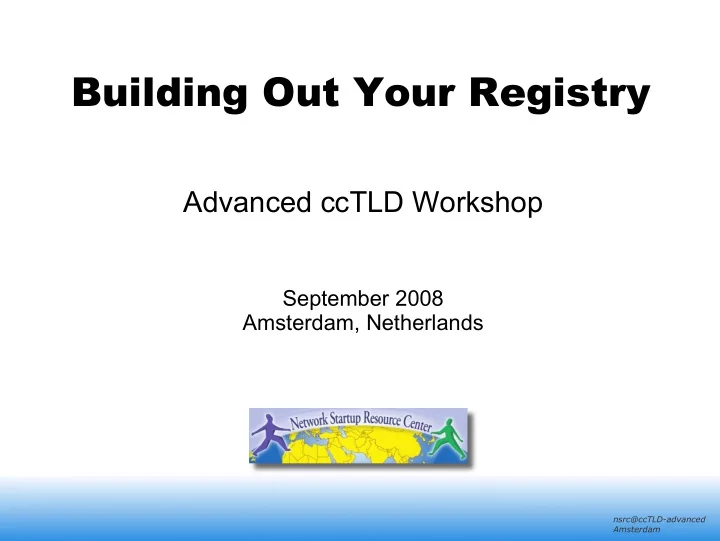

Building Out Your Registry Advanced ccTLD Workshop September 2008 Amsterdam, Netherlands nsrc@ccTLD-advanced Amsterdam
Topics Topics for this week were chosen based on the feedback we received. Details are available here: http://ws.edu.isoc.org/cgi-bin/wiki/pub/advanced-cctld.pl/Responses nsrc@ccTLD-advanced Amsterdam
Topics cont. The top requested topics were: 1) EPP 2) DNSSEC 3) Network Monitoring 4) Building out Your Registry 5) Registry Tools nsrc@ccTLD-advanced Amsterdam
Putting this in Context ● As your registry grows complexity advances. There are several key items involved: – Possibility of multiple registrars (epp) – Need to use robust back-end stores like databases. – Policy requirements (who can register what), dispute resolution, etc. – Security – such as DNSSEC and as it relates to availability. – Customer services, such as IDN, Help Desk, dispute resolution. nsrc@ccTLD-advanced Amsterdam
Or, Another Possibility ● You could outsource your registry services: ● Some issues: – Loss of local skill set to run the country TLD. – What happens if the external group goes away? – Does this work if your government uses your TLD? – Still need a contingency plan to host the zone and recover customer billing data. This is non- trivial. nsrc@ccTLD-advanced Amsterdam
Review ● We'll discuss some sample views of registry models. ● We'll break down the final view in to its component parts: – DNS – Hardware – Registry Data Store – Whois service – Registration process nsrc@ccTLD-advanced Amsterdam
Functions of a Registry T = technical data (zone content) P = policy data (local community policies, IANA policies) S = social data (contact info, billing data etc.) nsrc@ccTLD-advanced Amsterdam
Second Level Domains nsrc@ccTLD-advanced Amsterdam
Variation on the Model nsrc@ccTLD-advanced Amsterdam
Functions inside a Registry nsrc@ccTLD-advanced Amsterdam
The Component Parts • DNS Service • Hardware • Data Store • Whois Services • Registration Process nsrc@ccTLD-advanced Amsterdam
DNS: Publication • Tools related to this include: – DNS Servers such as BIND, NSD, PowerDNS – AXFR – rsync – database syncing – ?? Other nsrc@ccTLD-advanced Amsterdam
DNS: Quality Control • Is it secure? – DNSSEC • Zone file testing: – Use of scripts: • PERL NET::DNS • sed/awk • etc. nsrc@ccTLD-advanced Amsterdam
DNS: Monitoring • What do you monitor? – System level – Name server – Name service – Network nsrc@ccTLD-advanced Amsterdam
DNS: Monitoring cont. • System monitoring – SNMP – NAGIOS – Syslog – MRTG/RRDTool nsrc@ccTLD-advanced Amsterdam
DNS: Monitoring cont. • Name Server monitoring – Smokeping with DNS module – MRTG – Syslog with scripts (swatch, syslog-ng, etc.) – Network use (wireshark, tcpdump) – Name server checkers to verify correctness (next slide)... nsrc@ccTLD-advanced Amsterdam
DNS: Monitoring cont. DNS Name Server Checkers ● Lots of bad ones on the net – build in policies ● some policies utterly silly ● Decent ones – dnscheck.se – zonecheck.fr ● highly tunable nsrc@ccTLD-advanced Amsterdam
DNS: Monitoring cont. • The Name Service – dnsmon from RIPE NCC – DSC – Others? nsrc@ccTLD-advanced Amsterdam
Boxes: Your Hardware We do some hand-waving here... • As you grow your OS choices become very important. • The hardware you use is important. • The network and all it's physical components becomes more complex. This is another course... nsrc@ccTLD-advanced Amsterdam
Registry Data Store • This will likely grow and become complex. • Depending on your choice of implementation what you use may differ. • You may need more staff to manage your data store than the DNS. nsrc@ccTLD-advanced Amsterdam
Registry Data Store • Internal data store may include things like: – Registry data – ticket system data – billing information – public information (whois) • How you access this with what components will drive your design. nsrc@ccTLD-advanced Amsterdam
Whois Service • Public/external data store – Classic: port 43 – Via web interface – New: Crisp • Implementation of local privacy rules • Public social data • Internationalization (i18n) will have an affect. nsrc@ccTLD-advanced Amsterdam
Registration Process • Primary function – interface to the client (registrar, registrant) • Secondary function – Enforcement of local policies and regulations, e.g. • name valid and unique • registration number (if required by government etc.) – Billing information Methods: Web services, email client, EPP, Fax, phone etc. nsrc@ccTLD-advanced Amsterdam
Registration Process cont. • Use of EPP or similar tools – Name server delegation checker. Either prepackaged or locally written using: • PERL • Ruby • Python, etc. • Customer billing nsrc@ccTLD-advanced Amsterdam
Registration Process cont. Help Desk – Resolution of Conflicts • Consider issues such as: – Delegation problems • Particularly when delegation checks are done. – Conflicts about names • UDRP in-house or outsourced • Protests about registration rules – Technical problems • Complaints about DNS, etc. nsrc@ccTLD-advanced Amsterdam
Registration Process cont. Delegation Audits – Lame delegations – Key expiry detection for DNSSEC nsrc@ccTLD-advanced Amsterdam
What We'll Cover this Week • Operating System – We'll be using FreeBSD • Registration Tools – We'll cover what registry tools are available • Registry build-out – EPP • DNS Monitoring – DSC and dnsmon • DNS Security – DNSSEC nsrc@ccTLD-advanced Amsterdam
What We'll Cover cont. You should see how these topics: • Registration tools • EPP • DSC and RIPE NCC netmon • DNSSEC Fit some of the key pieces involved with building out a registry. nsrc@ccTLD-advanced Amsterdam
Results Good planning and implentation have led to: – Reliable and available TLDs. – Increased revenue, or reduction in costs. – Ability to expand operations and size more easily. nsrc@ccTLD-advanced Amsterdam
Recommend
More recommend